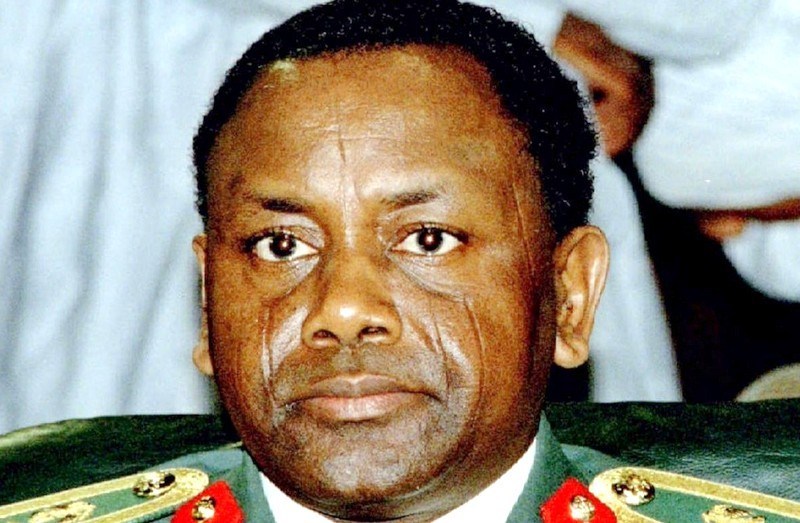
Twenty-one years ago, precisely on 8 June 1998, former Nigeria’s
maximum ruler, the late General Sani Abacha died mysteriously in office.
He was a man with peculiar history- he was a symbol of mutiny who
announced overthrow of three consecutive governments in Nigeria. He also
symbolised public treasury looting in a proportion never seen in the
history of Nigeria nay Africa. More than two decades after his demise,
his loots, stashed in so many foreign accounts across the globe, are
still being recovered.
On December 31, 1983, as a brigadier in Nigeria Army, he announced the overthrow of civilian government of Alhaji Sheu Shagari.
According to Osita Nwajah in PEOPLE IN TheNEWS: “His very graphic
analysis of the problems besetting the nation struck the right chord in
Nigerians. The association of his name with the disciplinarian,
no-nonsense ‘rescue team’ of Buhari-Idiagbon, lent Abacha a measure of
credibility in the public view. But he withdrew from the public glare to
be General Officer- Commanding, 2 Mechanized Division, Ibadan.”
Major-General Buhari, who took over as Head of State and
Commander-in-Chief of the Armed Forces of the Federal Republic of
Nigeria after the overthrow of Sheu Shagari, promoted Abacha to major-
general in 1984.
But, in a funny twist of event barely a year later, the new
Major-General Abacha, in an uncharitable manner, announced overthrow of
his commander-in-chief and benefactor, General Muhammadu Buhari on 27
August 1985. The latter was detained for over two years by the
succeeding government in which Abacha held strategic post of Chief of
Army Staff and later Minister of Defence.
He would later, in another twist of event, appoint the same Buhari
(now retired) in 1994 as Chairman of the Petroleum Trust Fund (PTF),
after he (Abacha) had become the Head of State of the Federal Republic
of Nigeria.
Abacha ironically wanted an impeccable hand with the required
experience to head such a very juicy and strategic agency and finally
settled for the retired general as the only one with such qualities at
the time. Buhari served meritoriously on the board till 8 June 1998 when
Abacha expired.
Abacha had, on 17 November 1993, forced the Head of Interim
National Government (ING), Chief Ernest Shonekan, to resign and assumed
the position of Head of State, Commander-in-Chief of the Armed Forces of
the Federal Republic of Nigeria.
During his five-year rule, he maximally expressed dictatorial
powers. He imprisoned, tortured and murdered anyone who challenged his
authority. He rigorously pursued agenda to perpetuate himself in office.
Therefore, when it was clear he was not going to handover as
expected to the acclaimed winner of June 12, 1993 Presidential Election,
Chief Moshood Kasimawo Olawale Abiola, popularly called M.K.O Abiola
(G.C.F.R), Nigerians nudged M.K.O to claim his mandate by declaring
himself president.
Abiola yielded and the popular ‘Epetedo Declaration’ came into
being. Abacha got infuriated and ordered arrest of the acclaimed
President. He charged Abiola with ‘treasonable felony’ and caged him
till both of them expired.
More on Abacha, such as the story of his dramatic marriage to
Mariam; how he gaoled and, in some instances, exterminated real and
imaginary enemies; the killing of Abiola’s irrepressible wife, Kudirat,
on June 4, 1996; events leading to the maximum ruler’s death and how
Nigerians reacted to announcement of his demise, are contained in a
500-page book of one hundred Nigerians who shaped the past, present and
future of this country in the century (1900 – 1999) entitled: PEOPLE IN
TheNEWS: A SURVEY OF NIGERIANS OF THE 20TH CENTURY published by the
Independent Communications Network Limited in March year 2000.
On page 5 of the book, Osita concludes his story on the late
dictator as follows: Abacha did not lay any claims to clairvoyance, but
during the inauguration of his Provisional Ruling Council on 24 November
1993, he made a statement that is in retrospect, too perceptive to be
ignored. “Some players bow out with boos while others do so with
applause and leave (behind) a sense of nostalgia …”. Five years later,
Abacha bowed out in ignominy, leaving in his wake a country in financial
and moral ruins.
***
Source: PM News





















0 comments:
Post a Comment